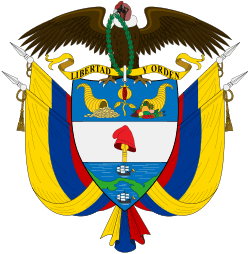Timeline of Cali
The following is a timeline of the history of the city of Cali, Colombia.
Prior to 20th century
Part of a series on the |
||||||||||||||||||||
|---|---|---|---|---|---|---|---|---|---|---|---|---|---|---|---|---|---|---|---|---|
| History of Colombia | ||||||||||||||||||||
 | ||||||||||||||||||||
| Timeline | ||||||||||||||||||||
|
||||||||||||||||||||
|
| ||||||||||||||||||||
- 1536 - Cali founded by Spaniard Sebastián de Belalcázar.[1]
- 1747 - Capilla de San Antonio (Cali) (church) built.
- 1802 - Metropolitan Cathedral of Cali built.
- 1810
- July 3: Cali declares independence from Spanish colonial rule.
- Population: 6,385.[2]
- 1811 - Cali joins the Confederated cities of the Cauca Valley.
- 1890 - Market Plaza built (approximate date).
20th century
- 1910 - Catholic Diocese of Cali,[3] regional administrative Valle del Cauca Department, and Cali Chamber of Commerce established.
- 1912 - Deportivo Cali (sport club) formed.
- 1913 - Cayzedo statue erected in the Plaza de Cayzedo.
- 1914 - Buenaventura-Cali railway begins operating.[4]
- 1927 - Cali City Theatre opens.
- 1931 - Teatro Jorge Isaacs (theatre) opens.
- 1933 - Palacio Nacional (Cali) built.
- 1937 - Estadio Olímpico Pascual Guerrero (stadium) opens.
- 1938 - Population: 88,366.[4]
- 1942 - Iglesia la Ermita (Cali) (church) rebuilt.
- 1945 - University of Valle established.
- 1946 - October: Economic unrest.[5]
- 1950 - El País newspaper begins publication.
- 1951 - Population: 284,186.[6]
- 1953
- La Estación (Cali) (railway station) opens.
- Biblioteca Departamental Jorge Garcés Borrero (library) established.
- 1956
- Dynamite explosion.
- Museo La Tertulia (museum) founded.
- 1957
- Cali Fair begins.
- Cañaveralejo bullring opens.
- 1968 - Farallones de Cali National Park established near city.
- 1969 - Cali Zoo founded.
- 1970
- Universidad Autónoma de Occidente established.
- Pontifical Xavierian University begins operating in Cali.
- 1971
- Palmaseca Airport, Coliseo El Pueblo (arena) and Velódromo Alcides Nieto Patiño open.
- 1971 Pan American Games held in Cali.
- 1973 - Population: 898,253 city; 923,264 urban agglomeration.[7]
- 1974 - Central de Transportes de Cali built.[8]
- 1977 - Criminal Cali Cartel active.
- 1979 - Universidad Icesi founded.
- 1980
- 1984 - Cali Tower built.[8]
- 1985 - Population: 1,369,331.[10]
- 1990
- Cali Cultural Center built.
- Loma de la Cruz Artisan Park established.
- 1992
- Rodrigo Guerrero becomes mayor.
- Population: 1,759,139.[9]
- 1995
- December 20: Airplane crash in nearby Buga.
- Feria del Libro Pacífico (book fair) begins.
- 1996 - El Gato del Río sculpture erected at Avenida del Río.
- 1999 - Church kidnapping.[11][12]
21st century
- 2001 - Jardin Botanico de Cali (garden) established.[13]
- 2002 - April 12: Valle del Cauca Deputies hostage crisis begins.
- 2004 - Criminal Los Rastrojos active.
- 2005 - Population: 2,119,908.[1]
- 2007 - Centro de Eventos Valle del Pacifico built.
- 2008 - Caliwood film museum opens.
- 2009 - Masivo Integrado de Occidente (transit system) begins operating.
- 2010 - Estadio Deportivo Cali (stadium) opens.
See also
- Cali history
- History of Cali
- List of mayors of Cali
Other cities in Colombia:
References
- 1 2 Harvey F. Kline (2012). Historical Dictionary of Colombia. Scarecrow Press. ISBN 978-0-8108-7955-3.
- ↑ "Así era Cali en 1810", El Pais (in Spanish), July 20, 2010
- ↑ "Chronology of Catholic Dioceses: Colombia". www.katolsk.no. Norway: Roman Catholic Diocese of Oslo. Retrieved January 30, 2015.
- 1 2 Leon E. Seltzer, ed. (1952), Columbia Lippincott Gazetteer of the World, New York: Columbia University Press, p. 310, OL 6112221M
- ↑ James D. Henderson (2001). Modernization in Colombia: The Laureano Gómez Years, 1889-1965. University Press of Florida. ISBN 978-0-8130-3124-8.
- ↑ "Population of capital city and cities of 100,000 or more inhabitants". Demographic Yearbook 1955. New York: Statistical Office of the United Nations.
- ↑ United Nations Department of Economic and Social Affairs, Statistical Office (1976). "Population of capital city and cities of 100,000 and more inhabitants". Demographic Yearbook 1975. New York. pp. 253–279.
- 1 2 Luis Fernando González Escobar (2010). Ciudad y arquitectura urbana en Colombia 1980-2010 (in Spanish). Editorial Universidad de Antioquia. ISBN 978-958-714-382-9.
- 1 2 World Bank 2002.
- ↑ United Nations Department for Economic and Social Information and Policy Analysis, Statistics Division (1997). "Population of capital cities and cities of 100,000 and more inhabitants". 1995 Demographic Yearbook. New York. pp. 262–321.
- ↑ "Colombia Rebels Kidnap 100 At Mass but Later Let Most Go", New York Times, May 31, 1999
- ↑ "Colombia". Political Chronology of the Americas. Routledge. 2003. ISBN 978-1-135-35653-8.
- ↑ "Garden Search: Colombia". London: Botanic Gardens Conservation International. Retrieved December 30, 2015.
This article incorporates information from the Spanish Wikipedia and French Wikipedia.
Bibliography
- Isaac F. Holton (1857), "Cali", New Granada: Twenty Months in the Andes, New York: Harper & Brothers, OCLC 2422862
- "Cali", Encyclopædia Britannica (11th ed.), New York, 1910, OCLC 14782424
- Rakesh Mohan (1994), Understanding the Developing Metropolis: Lessons from the City Study of Bogotá and Cali, Colombia (2nd ed.), Oxford University Press / World Bank, ISBN 9780195208825
- Cali, Colombia: Toward a City Development Strategy. Washington DC: World Bank. 2002. ISBN 978-0-8213-5174-1.
- Politics and Security in Three Colombian Cities, London: Crisis States Research Centre, 2009 – via International Relations and Security Network (about Bogota, Cali, Medellin)
External links
| Wikimedia Commons has media related to Cali. |
- Map of Cali, 1981
- Map of Cali, 1995
Coordinates: 3°25′14″N 76°31′20″W / 3.420556°N 76.522222°W
This article is issued from
Wikipedia.
The text is licensed under Creative Commons - Attribution - Sharealike.
Additional terms may apply for the media files.